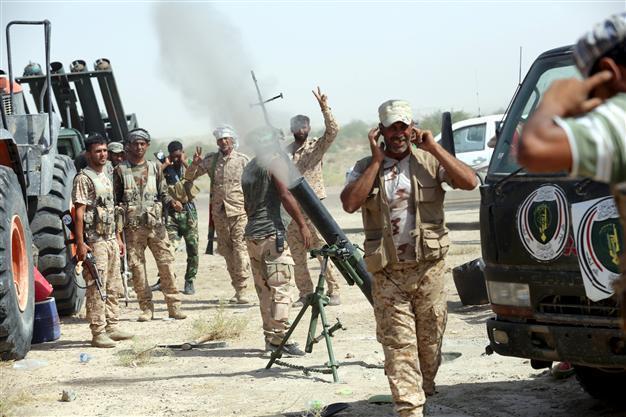Coalition-backed Iraq forces in fresh Anbar push
BAGHDAD - Agence France-Presse

Members of Iraq's Shi'ite paramilitaries launch a mortar towards ISIL militants on the outskirts of the city of Falluja, in the province of Anbar, Iraq July 12, 2015. Reuters Photo
Iraqi forces tightened the noose on the Islamic State of Iraq and the Levant (ISIL) in its stronghold of Anbar on July 13 with a ground operation teed up by a record number of coalition air strikes.
Iraqi security forces, Shiite paramilitaries and Sunni tribal fighters advanced towards Ramadi and Fallujah, the two main cities in the western province of Anbar.
In a long-awaited morale boost, a much-delayed first batch of US F-16 fighter jets flew to Iraq on July 13, a delivery that should enhance the capacity of the country's embattled military.
However, it was warplanes from the US-led coalition that did the grunt work in Anbar on July 12 when 29 strikes were carried out against ISIL targets, the American military said.
"Near Ramadi, 29 air strikes struck 67 ISIL staging areas destroying two ISIL excavators, an ISIL armoured personnel carrier, and an ISIL vehicle," the US statement said.
That number of strikes on a single area on the same day is unusually high.
The US statement did not provide specific locations, but on July 13 Iraqi forces recaptured two villages east of Ramadi.
"The security forces were able to advance and liberate the areas of Albu Shijil and Shiha near Khaldiyah, between Saqlawiya and Ramadi," an army lieutenant colonel said.
A top official from the Khaldiyah area, Ibrahim al-Fahdawi, confirmed the liberation of the two villages in the Euphrates Valley.
Iraq's joint operations command trumpeted the launch of "operations to liberate Anbar" at dawn, but provided few details.
A commander of a Hashed al-Shaabi unit of Sunni tribal fighters said the Al-Sijer area was retaken on July 13, further isolating Fallujah, which lies about half way between Baghdad and Ramadi.
Operations to liberate Anbar, the vast western Iraqi province which is largely controlled by ISIL, have been previously announced.
The last one was proclaimed in the immediate aftermath of the shock capture by the jihadists of the provincial capital Ramadi in mid-May.
The government had to call in the Hashed, an umbrella organisation whose main components are Tehran-backed Shiite militias, to supplement its own underperforming forces.
The army and the Hashed have sent conflicting messages as to whether Ramadi or Fallujah should be the first target of their efforts in Anbar.
The army, which has direct support from the coalition, favours going for Ramadi first, while the Hashed al-Shaabi has most of its forces around Fallujah.
Fallujah has been out of government control since the start of 2014 and is where US forces faced their toughest battles during their eight-year occupation of Iraq.
Senior commanders have said that no attempt to retake Fallujah would begin before Eid al-Fitr, the holiday marking the end of the holy Muslim fasting month of Ramadan and which is due to begin at the end of the week.
At least 23 people were killed Sunday in a string of bombings in Shiite neighbourhoods of Baghdad, several of them suicide attacks. They were claimed by ISIL.
Iraqi pilots flew four F-16 fighter jets to the Balad air base north of Baghdad on July 13, a delivery that was delayed by fighting near the base earlier this year.
Iraq has ordered a total of 36 F-16s from the US but delivery has been slow and reinforcements to its air force when ISIL threatened to take over the country last year came from Russia and Iran in the form of Sukhoi jets.
The more sophisticated F-16s received on July 13 are expected to enhance the Iraqi air force's capacity, but with foreign aircraft in action every day since last year, their delivery is not seen as a game-changer in the war against ISIL.
According to a report released by the United Nations Monday, at least 15,000 civilians have been killed and twice as many wounded since the start of the armed conflict at the beginning of 2014.
Three million people have also been displaced by the violence over the same period.
